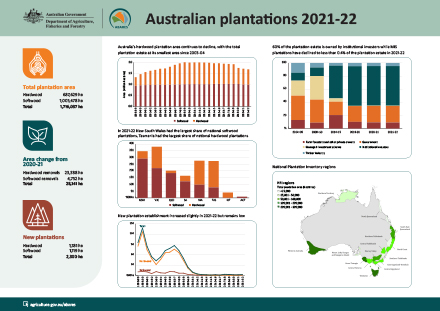Australia’s plantation estate is still on a worrying downward trajectory, according to the latest Australian Bureau of Agricultural Economics figures. Australia’s total plantation area contracted to 1.716 million hectares in 2021-22 – a reduction of more than 28,000 hectares. Source: Timberbiz
“This continued decline in Australia’s plantation estate is extremely concerning and is a reminder that collectively, industry, federal and state governments and other decision and policy makers need to work together to get more timber trees planted for the future,” Acting Chief Executive Officer of the Australian Forest Product Association (AFPA), Natasa Sikman said.
“In the same reporting period, there was a small increase in new plantations of 2,300 hectares (hardwood, 1,181 ha and softwood 1119 ha) but these new plantings will not be enough to meet future demand.
“Australia’s national plantation estate has fallen by more than 250,000 hectares from 1.973 million hectares in 2014-15 to 1.716 million hectares in 2021-22. Australia is currently importing over $6 billion worth of wood products and we already rely on imports for up to 25 per cent of the timber needed to build Australian houses. As the Government looks to build 1.2 million new houses over the next five years, our reliance on imported timber will dramatically increase.
In Tasmania the state’s total plantation area contracted to 278,500 hectares in 2021-22 – a reduction of more than 31,000 hectares since 2014-15, according to the Tasmanian Forest Products Association Chief Executive Officer, Nick Steel.
“This continued decline in the plantation estate across Tasmania is extremely concerning and is a reminder that collectively, industry, governments, and other decision and policy makers need to work together to get more timber trees planted for the future,” Mr Steel said.
“Australia is currently importing over $6 billion worth of wood products, and we already rely on imports for up to 25% of the timber needed to build our houses.
“As the Tasmanian and Australian Government look to build over 12,000 affordable new houses in Tasmania over the next decade, our reliance on imported timber will increase,” he said.
“That’s why it’s essential Tasmanian forestry is included in our state’s housing policy, to ensure that timber grown in Tasmania is used to house Tasmanian families.”
Ms Sikman said that global demand for timber and wood fibre products is forecast to quadruple by 2050 and it is why countries such as the United Kingdom including timber use into their Net-Zero Strategy.
“The key element of the UK strategy is to increase public demand for sustainably sourced timber through procurement policies and encouraging research into barriers to the uptake of timber.
“Indeed, recently King Charles visited James Jones and Sons where he discussed the significant benefits of productive forestry a company which partners with Australian based Hyne Timber and XLam,” she said.
“AFPA supports the Federal Government’s commitment to plant one billion new production trees and Australia’s forestry sector recognises the work and investment by the Albanese Government, but more is needed to reverse this downward trend in our plantation estate while also increasing the use of timber in the construction sector.
“An increased plantation estate alongside a strong native sector will be critical for Australia to meet its own net zero goals while also contributing to the global climate change fight,” Ms Sikman said.







